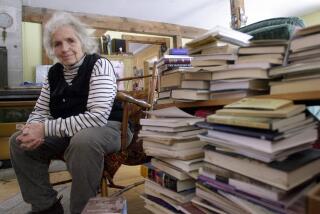A Time for Songs, for Joy, for Sorrow
As the lights dimmed and the curtain rose, the passion of Zlata Lyashkevich at the piano filled the room with the music of Moshe and Rose Gershovitzâs boy.
The music was a fitting overture to a program dedicated to Russian Jewish artists and writers killed under Josef Stalinâs dictatorship, as it was composed by this son of Russian Jewish immigrants--Jacob Gershovitz. We know him as George Gershwin.
The music: âRhapsody in Blue.â
Many in this audience of about 250 were white-haired; they had lived in Stalinâs Russia. For them, this Sunday afternoon gathering at the Westside Jewish Community Center was at once joyous and sorrowful.
Among them was Vera Pauker, who came to America in 1980. Pauker, whoâs on staff at the center, dreams of a Russian theater in Los Angeles. âThere are so many Russian Jewish singers and actors here, and they cannot find any work.â
They include pianist Lyashkevich and bass Yuri Edelman, both 51, an artistic team for six years. They came from Moscow nine months ago. Lyashkevich, a graduate of Moscow Conservatory, teaches part time at California State University, Los Angeles, and plays at an Italian restaurant in Glendale. Edelman, who sang with the Moscow Philharmonic and in concerts and opera throughout Eastern Europe, is working as a carpenter.
Still, Lyashkevich says, in Russia things are far worse. âThe artistâs life is very hard now because of politics, the economy. Nobody goes to concerts. There is no money for tickets. We are not needed in our country.â
Nor, despite their considerable talents, is it any picnic here, where their names are not household words and English does not come easily to them.
There is Arta Shess, 55, an Armenian, who arrived in 1992. A powerful baritone who sang major opera roles throughout Eastern Europe, he now is relegated largely to singing at venues such as senior-citizen centers.
For this audience, his songs needed no introduction. He sang first in Yiddish, about a rabbi. Then he sang Eli, Eli, a Hebrew prayer, throwing kisses to an audience that lured him back with a cadence of clapping.
Although he can sing in English, he says, âI have wonderful voice, but nobody knows me here.â
Edelman wishes that there was more call for a Russian-born singer with limited English. He will tell you that he is very happy to be in America and he is optimistic. His attitude seemed to echo the theme for the day, Nit Gedeiget, Yiddish for âCheer up--donât worry.â
But the stage backdrop, a sort of mask of tragedy, was a grim reminder of the obliteration of Jewish culture and tradition in Russia during the â30s and â40s.
In Russian, narrator Ana Feldman, a former Moscow University professor, told the story of Solomon Mikhoels, creator of the Yiddish State Theater in Moscow in the â20s and its director until he died in 1948.
The official line: The actor, an activist who also headed the Jewish Anti-Fascist Committee, died in a car accident. Many Jews, however, think he was murdered by the Soviet secret police.
Now, 46 years later, he was present in spirit on a scratchy recording from his most famous role, âKing Lear.â
âOur future is in the hands of our children,â says Feldman, who then brought on seven boys and girls in blue and white--the colors of Israel--to perform a dance, LâChaim (âTo Lifeâ). Still, none in this hall had forgotten the past.
Feldman spoke with passion of the Soviet purges of the â40s, the arrests on trumped-up charges of hundreds of the Jewish cultural elite. âEvery night people were expecting someone to come and arrest them.â On Aug. 12, 1952, after secret trials, 24 Jews, among them poet Perets Markish and childrenâs writer Lev Kvitko, were executed.
This concert was for remembering them, too.
In his booming bass, Edelman, accompanied by Lyashkevich, sang in Yiddish about the search for peace and love and the good life.
At the end, children brought flowers up to the artists, who led audience members--now on their feet--in singing, in Hebrew, Shalom Alechem .
Peace to you.
This program, with English interpretation, will be presented again at 2 p.m. March 20 at Westside Jewish Community Center, 5870 W. Olympic Blvd.
One Good Turn Deserves Another
On Aug. 11, 1992, Darlene Theakston and Marcus Magee--his kidneys were deteriorating as a result of childhood-onset diabetes--checked into St. Vincentâs Hospital. They checked out a week later, with one of her kidneys at work in his body.
âIt was a miracle,â says Magee, 30.
He had hoped this would be an engagement of sorts, an unbreakable bond. But, alas, the romance fizzled. They remain good friends.
Recently, Theakston, a 27-year-old jobless legal secretary--and about 40,000 others--entered a drawing at the tribal-run Casino Morongo near Palm Springs. Guess who walked off with the expenses-paid trip for two to anywhere in the world--plus $2,000 mad money?
Considering that two years earlier doctors had told her there was only a one-in-a-million chance that her kidney would be a match for Magee, Theakston has to wonder if she has âa direct line with God all of a sudden.â Some would simply argue that one good deed deserves another.
In mid-April, Theakston, who lives in Santa Monica, will fulfill a dream when she and Julie Jackson of Rancho Cucamonga travel to Egypt and Israel.
Sheâs feeling just fine. âI am missing a rib,â she says, referring to the one surgeons removed to get to that kidney. The rib is in a jar in her closet.
This weekly column chronicles the people and small moments that define life in Southern California. Reader suggestions are welcome.
More to Read
The biggest entertainment stories
Get our big stories about Hollywood, film, television, music, arts, culture and more right in your inbox as soon as they publish.
You may occasionally receive promotional content from the Los Angeles Times.










